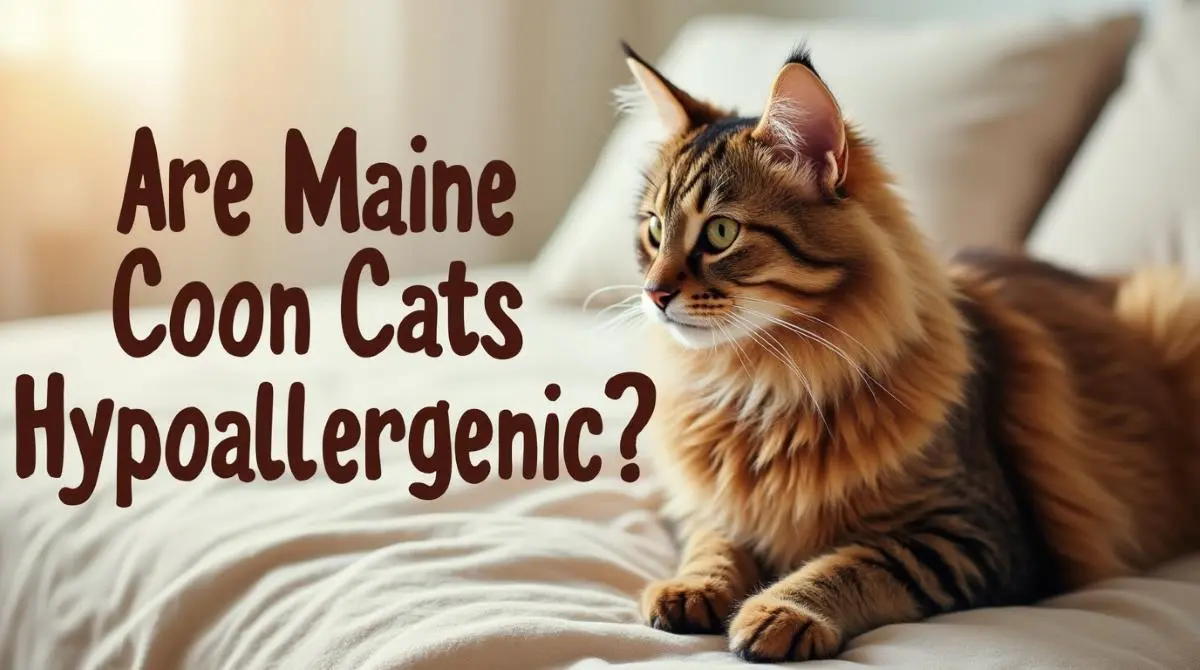Are Maine Coon cats hypoallergenic? is a question many cat lovers with allergies ask before welcoming this gentle giant into their homes. While Maine Coons are beloved for their friendly personalities and majestic coats, their hypoallergenic status is shrouded in myths. Unlike truly hypoallergenic cat breeds, Maine Coons produce allergens like Fel d 1 protein in their saliva and dander, which can trigger reactions in sensitive individuals.
However, their moderate shedding and unique grooming habits leave many wondering if they’re a safer choice for allergy sufferers. In this post, we’ll separate fact from fiction, exploring Maine Coon cat allergies, debunking common misconceptions, and sharing actionable tips to reduce allergens. Whether you’re drawn to their charm or seeking clarity on hypoallergenic traits, we’ll help you decide if this breed fits your lifestyle—without the sneezes!
Table of Contents
What Does “Hypoallergenic” Really Mean for Cats?
The Science Behind Hypoallergenic Cat Breeds
The term “hypoallergenic” is often misunderstood. While no cat is completely allergy-proof, hypoallergenic breeds produce fewer allergens like Fel d 1 protein, a common trigger found in cat saliva, skin, and dander. These breeds (e.g., Siberian or Balinese cats) typically have genetic traits that lower Fel d 1 production or shed less dander. However, “hypoallergenic” doesn’t mean “safe for all allergy sufferers”—it simply implies a reduced risk of reactions. For Maine Coon cats, their large size and dense fur mean they produce more dander and allergens compared to truly hypoallergenic breeds.
Why Maine Coons Aren’t Truly Hypoallergenic
Maine Coon cats are not hypoallergenic despite claims suggesting otherwise. Their long, water-resistant fur traps dander and saliva close to the skin, which spreads allergens during grooming or shedding. Unlike low-shedding breeds, Maine Coons shed seasonally, releasing allergen-laden hairs into your home. Additionally, they produce Fel d 1 protein at levels similar to other cats, debunking the myth that their size or coat type makes them safer for allergy-prone owners. While individual reactions vary, most allergists caution that Maine Coons are not ideal for severe allergy sufferers.
Common Misconceptions About “Hypoallergenic” Labels
Many believe “hypoallergenic” guarantees an allergy-free experience, but this is a dangerous myth. For example, some assume Maine Coons are hypoallergenic because their fur feels less “itchy,” but allergens come from saliva and dander, not fur texture. Another misconception is that frequent bathing eliminates allergens—though it helps, allergens rebound within days. Lastly, terms like “low-shedding” are often confused with “hypoallergenic,” but even minimal shedding can spread enough Fel d 1 to trigger symptoms. Understanding these nuances helps set realistic expectations for living with a Maine Coon.
Maine Coon Cats and Allergens: The Hidden Truths
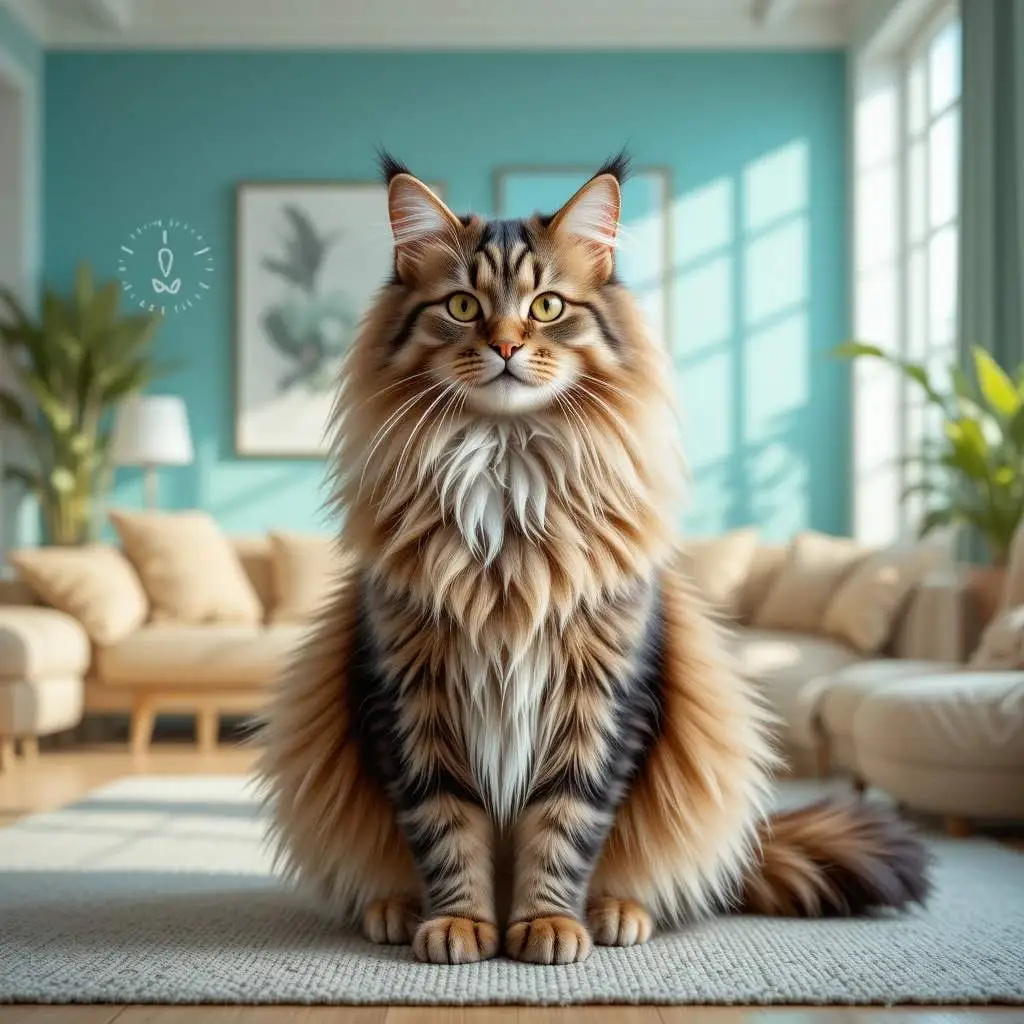
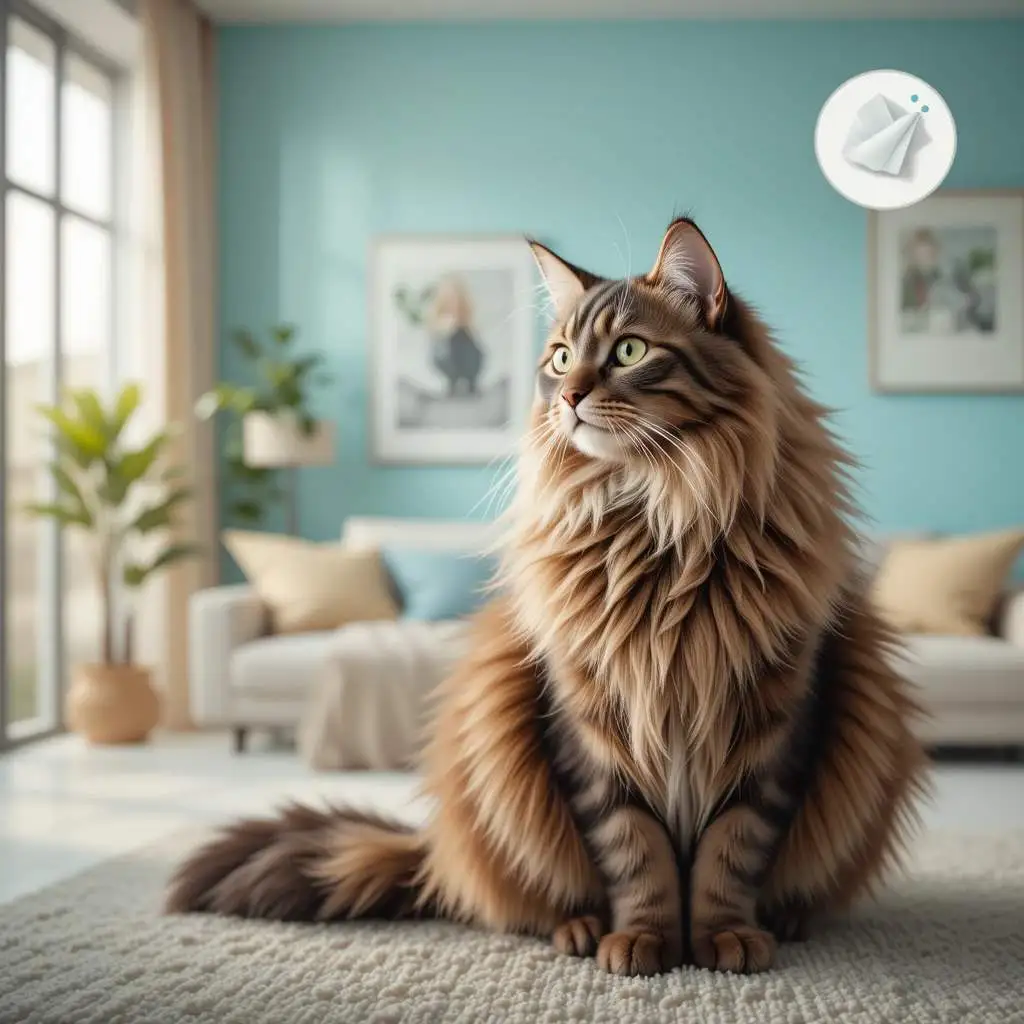
How Maine Coons Produce Fel d 1 Allergen
Maine Coon cats produce Fel d 1 protein—the primary allergen in cats—through their saliva and skin glands. When they groom, this protein spreads onto their fur and dries into airborne particles. Despite their thick coats, Maine Coons don’t produce less Fel d 1 than other breeds. Their large size means more surface area for allergen production, making them a higher-risk choice for allergy-prone owners.
Reasons Maine Coons Trigger Allergies
- Heavy Seasonal Shedding: Their dense undercoat sheds seasonally, releasing dander and fur loaded with allergens.
- Saliva Spread: Frequent grooming deposits saliva (and Fel d 1) onto their fur, which becomes airborne as it dries.
- Size Matters: Larger cats = more skin surface = higher dander production. Even mild shedders can overwhelm sensitive individuals.
Comparing Maine Coons to Truly Hypoallergenic Breeds
Breeds like Siberians or Sphynx cats are labeled hypoallergenic because they produce less Fel d 1 or lack fur to trap dander. Maine Coons, however, shed heavily and lack genetic traits that reduce allergens. While no cat is 100% hypoallergenic, breeds like the Balinese or Devon Rex are better suited for allergy sufferers due to their lower allergen output and minimal shedding.
Debunking 10 Myths About Maine Coons and Allergies
Myth 1: “Maine Coons Are Hypoallergenic Because They’re Low-Shedding”
Truth: Maine Coons shed seasonally and release significant dander. Their thick fur traps allergens, making them a poor choice for allergy sufferers despite their “low-shedding” reputation.
Myth 2: “Their Saliva Doesn’t Contain Allergens”
Truth: Fel d 1, the primary allergen, is in Maine Coon saliva. When they groom, it spreads to their fur and becomes airborne, triggering reactions.
Myth 3: “Short-Haired Maine Coons Are Safer”
Truth: Fur length doesn’t reduce allergens. Allergens come from skin and saliva, so even short-haired Maine Coons can cause allergies.
Myth 4: “Females Are Less Allergenic Than Males”
Truth: Gender doesn’t affect Fel d 1 levels. Neutered males may have slightly lower allergens, but not enough to prevent symptoms.
Myth 5: “Kittens Don’t Trigger Allergies”
Truth: Maine Coon kittens produce allergens from birth. Reactions often start early and worsen as they age and groom more.
Myth 6: “Bathing Eliminates Allergens Completely”
Truth: Bathing reduces allergens temporarily, but Fel d 1 rebounds within days. Frequent grooming helps but isn’t a cure.
Myth 7: “Hypoallergenic Diets Make Maine Coons Safe”
Truth: No diet eliminates Fel d 1. While nutrition improves coat health, it doesn’t address the root cause of allergies.
Myth 8: “Maine Coons Are Allergy-Friendly for Everyone”
Truth: Allergy tolerance varies. Some people react mildly, but severe sufferers will likely struggle despite the breed’s charm.
Myth 9: “Air Purifiers Neutralize All Allergens”
Truth: HEPA filters reduce airborne dander but can’t remove allergens embedded in furniture, carpets, or clothing.
Myth 10: “Allergy Shots Guarantee a Reaction-Free Life”
Truth: Immunotherapy helps some people, but it’s not foolproof. Many still need medication or lifestyle changes to manage symptoms.
Practical Tips for Living With a Maine Coon If You Have Allergies
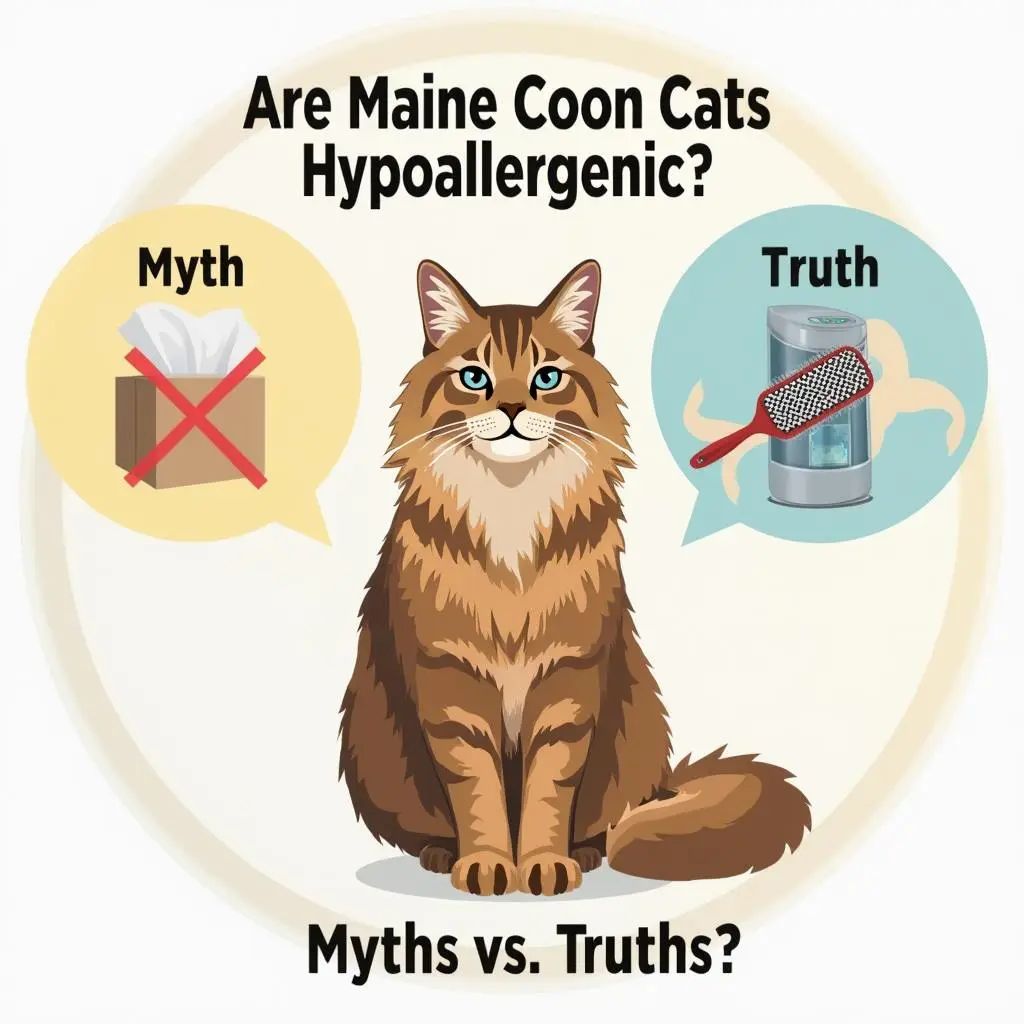
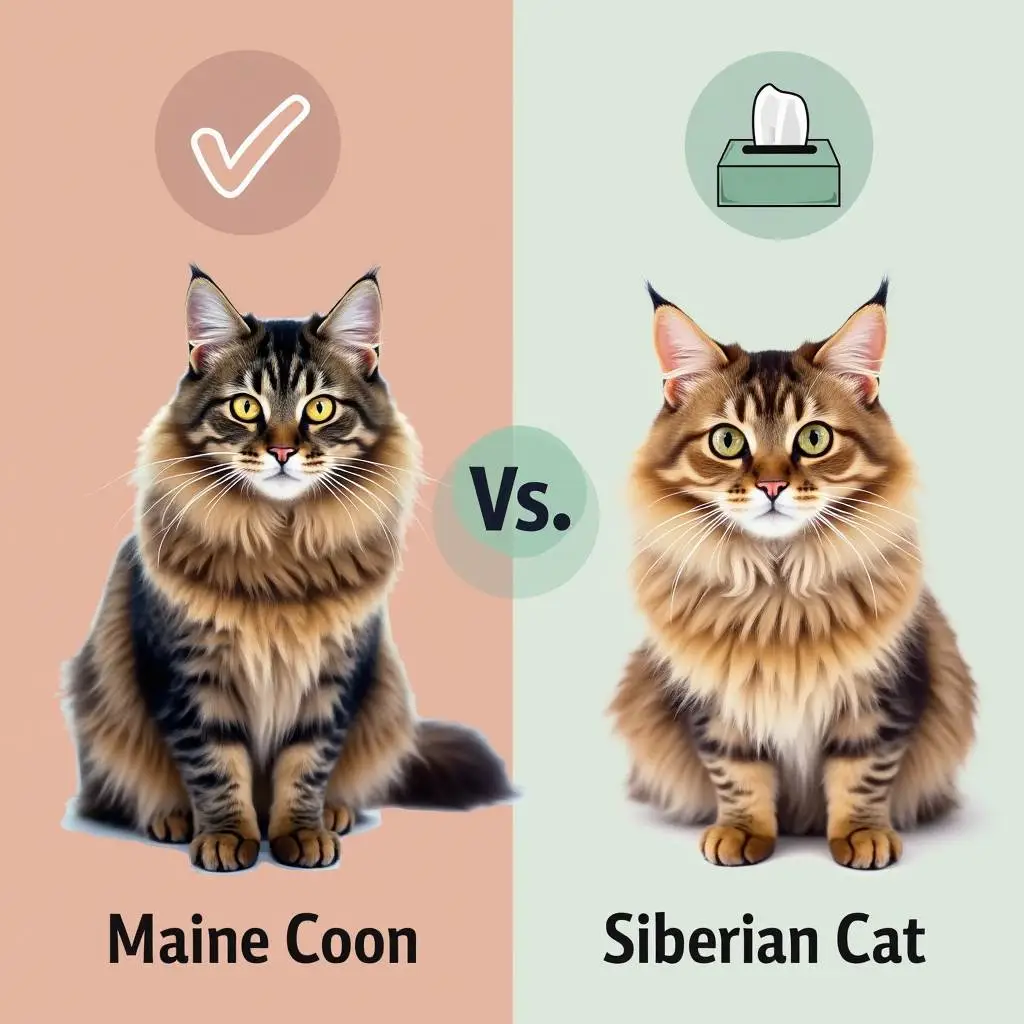
Grooming Routines to Reduce Dander
Daily brushing with a deshedding tool is crucial for Maine Coons. Their thick fur traps allergens, so frequent grooming minimizes loose hair and dander. Bathe your cat every 4-6 weeks using a hypoallergenic pet shampoo to wash away saliva-borne allergens. Wipe their coat with pet-safe allergen wipes between baths to reduce Fel d 1 buildup. Trim their fur (especially around the paws and tail) to limit allergen spread.
How to Allergy-Proof Your Home
Start by investing in a HEPA air purifier to capture airborne dander. Use allergen-resistant covers on furniture and bedding, and vacuum carpets daily with a HEPA-filter vacuum. Designate cat-free zones (like bedrooms) to create safe spaces. Wash your Maine Coon’s toys, blankets, and bedding weekly in hot water (over 130°F) to neutralize allergens. Replace fabric curtains with washable blinds to reduce dust traps.
When to Consult an Allergist or Vet
If symptoms persist, an allergist can recommend immunotherapy (allergy shots) or prescribe stronger antihistamines. A vet might suggest omega-3 supplements to improve your cat’s skin health, reducing dander production. For severe allergies, allergy testing can identify specific triggers, helping you tailor your home and grooming routines. Combining professional advice with daily habits ensures a happier life with your Maine Coon.
Alternatives to Maine Coons for Allergy Sufferers
Top 5 Hypoallergenic Cat Breeds to Consider
If allergies are a concern, consider breeds like the Siberian, Balinese, or Sphynx. Siberians produce less Fel d 1 protein, making them a top choice. Balinese cats have single-layer coats that shed less dander, while Sphynx cats lack fur entirely, reducing allergen spread. Other options include the Devon Rex and Cornish Rex, known for their short, curly coats and minimal shedding.
Are Mixed-Breed Cats Better for Allergies?
Mixed-breed cats aren’t inherently hypoallergenic, but some may produce fewer allergens due to genetic diversity. Adopting a mixed-breed cat from a shelter allows you to spend time with them before committing, helping you gauge your allergy response. However, there’s no guarantee they’ll be safer than purebred Maine Coons.
Final Thoughts: Balancing Love for Maine Coons and Health
If you’re set on a Maine Coon but have allergies, focus on allergy management strategies like grooming, air purifiers, and medication. For severe allergies, hypoallergenic breeds may be a better fit. Always consult an allergist or vet to explore options that balance your love for cats with your health needs.
Conclusion “Are Maine Coon cats hypoallergenic?”
So, are Maine Coon cats hypoallergenic? The answer is no—Maine Coons are not hypoallergenic. While their majestic appearance and gentle nature make them irresistible, their thick fur and high Fel d 1 production can trigger allergies in sensitive individuals.
However, with proper grooming, allergy-proofing your home, and consulting professionals, you can still enjoy life with a Maine Coon if your allergies are mild. For severe allergy sufferers, exploring truly hypoallergenic breeds like Siberians or Sphynx cats might be a better option. At the end of the day, understanding the facts about Maine Coon cat allergies helps you make an informed decision that balances your love for cats with your health.
FAQs About “Are Maine Coon cats hypoallergenic?”
Are Maine Coons hypoallergenic?
Maine Coon cats are not truly hypoallergenic. Although their thick, luxurious fur might suggest a lower spread of allergens, they still produce Fel d 1—the protein found in cat saliva, dander, and skin that triggers most allergic reactions. Regular grooming and diligent home cleaning can help manage allergen levels, but if you have significant cat allergies, you’re likely to experience symptoms around Maine Coons.
Is The Maine Coon Hypoallergenic?
Despite their many appealing qualities, Maine Coons are not hypoallergenic. They shed their long fur along with dander that carries the Fel d 1 protein, much like any other cat breed. If you suffer from allergies, extra measures such as frequent bathing, grooming, and the use of HEPA filters may be necessary, though these steps might not completely prevent allergic reactions.
What is the most hypoallergenic cat?
While no cat is completely allergen-free, many experts point to the Siberian as the most hypoallergenic breed. Siberian cats tend to produce lower levels of the Fel d 1 allergen, and many allergy sufferers report experiencing fewer symptoms around them. That said, individual reactions vary, so spending time with a Siberian before adoption is a wise idea.
Can you have a Maine Coon if you are allergic to cats?
It is possible for some people with mild allergies to live with a Maine Coon by taking proactive steps. Regular grooming, thorough cleaning, and air purification can help minimize allergen levels, and over-the-counter or prescription allergy medications might ease your symptoms. However, if your allergies are more severe, even these measures may not fully prevent reactions, so it’s important to test your sensitivity before committing to a Maine Coon.

